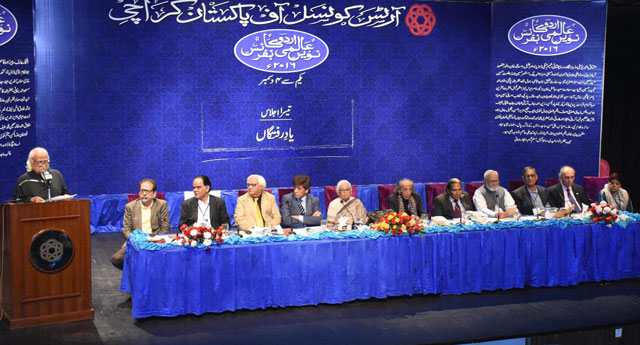
He was speaking on the last day of the ninth Aalmi Urdu Conference on Sunday during a 'Yaad-e-Raftagaan' session. The session was moderated by Javed Hassan and was held to remember the departed souls who spent their lives serving the Urdu language as authors or poets.
"It is better to remember these people as lost ones but not left ones," said Maqsood, reading an essay he wrote for his sister. She was born among books and our paternal grandfather first let her hold a pen, which she never let go of throughout her life, he recalled.
Bajia was 13 years old when she wrote her first novel and was married at the age of 17 but decided to walk out of the marriage and return to her family when she was only 19.

Maqsood remembered how she had a special bond with their mother, whom they called 'Pashi'. "Bajia and Pashi always wore white saris and blouses and, with the passing of time, Bajia got white hair, too," he said, adding that whenever he asked her to dye her hair, she would say 'black is the colour of mourning while white is not'.
Bajia started teaching at a school when her father died and the responsibility of her 10 siblings' welfare fell on her shoulders. A friend of her father's asked
her to write for PTV, for which she shifted to Islamabad. "She used to write while sitting on the floor and always recited her piece to Pashi first; they both liked to read and write," Maqsood added.
Speaking about the founder of the Sakinan-e-Shehr-e-Quaid, Azhar Abbas Hashmi, his close friend, Safwanullah, reminisced about their five-decade-long bond. "It is difficult to talk about him as it still feels like he will come back," said Safwanullah, adding that their friendship began in university.
Hashmi actively worked for the resolution of social issues and contributed to Urdu literature besides being behind the Aalmi Mushaira, which has been held for the last three decades. His friend termed his death a 'loss for the literary fraternity'.
Remembering the efforts of Jamiluddin Aali in fulfilling the will of Baba-e-Urdu in establishing Urdu University, critic Saher Ansari spoke of his character as a poet, columnist and the man behind shaping the Anjuman-e-Taraqqi-e-Urdu what it is today.
He was a man of words and he never felt ashamed of what he was, he always shared his own stories and made people around him laugh but at the same time he was a very serious man and felt the sorrow of people close to him, Ansari explained.
"He is not gone, he is still with me," said Asif Farrukhi about his late father, writer and critic Aslam Farrukhi. He was fond of poetry and he even recited verses while asking for food at the table, said Asif. "He was [a] hardworking [person]; he always worked for what he achieved in life," he recalled.
Most people do not remember their first meetings but Akhter Waqar Azhar clearly remembers how he met his mentor in PTV, Aslam Azhar.
"He taught me everything with his pipe in the mouth and reading newspapers in his room," he said, adding that he never compromised on his morals and values but decided to leave his first love, which was PTV.
Agha Saleem and Mustafa Zaidi were also remembered during the session.
Published in The Express Tribune, December 5th, 2016.

1732441915-0/BeFunky-collage-(12)1732441915-0-165x106.webp)

1732438802-0/BeFunky-collage-(11)1732438802-0-165x106.webp)













COMMENTS
Comments are moderated and generally will be posted if they are on-topic and not abusive.
For more information, please see our Comments FAQ